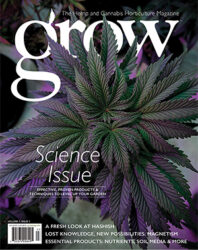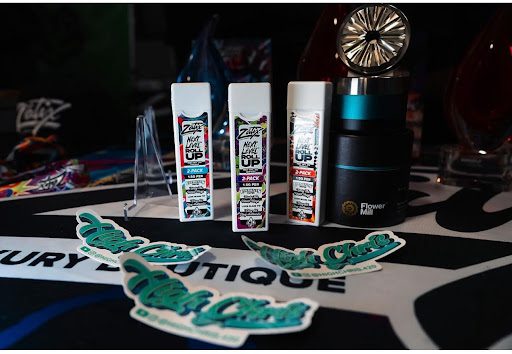Cannabis/hemp is more than smokeable. The plant serves a vast range of purposes in life. More than just a medicinal herb, it is also clothing, housing, food, materials like paper, and much more. As legalization continues to sweep the nation, every industry is starting to embrace cannabis/hemp including using hemp fabric in fashion.
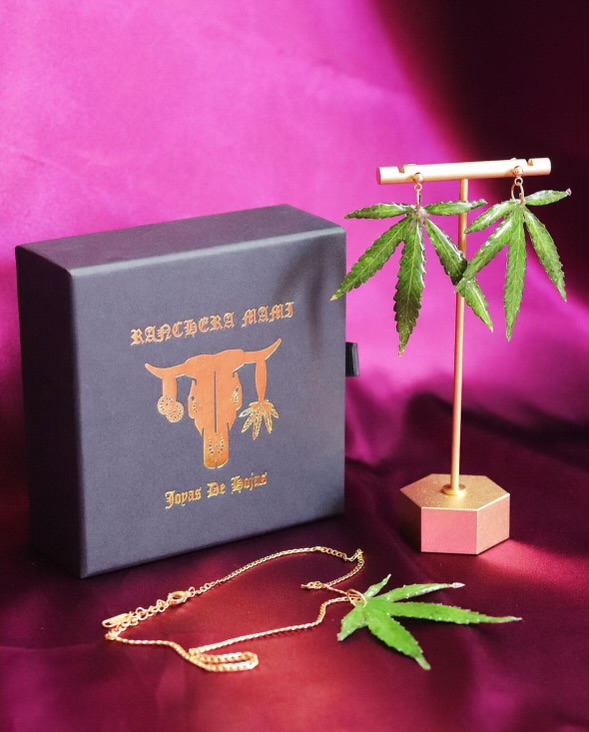
Designers and brands are starting to use hemp fabric in fashion where they were once using cotton. Miami is hosting fashion shows with models smoking on the runway, and accessories such as cannabis leaf charm necklaces are being worn all over the world. With its sustainable properties, hemp fashion is more than just a trend — it’s an ecologically-conscious movement. In the face of climate change, innovative hemp fabrics aren’t only aesthetically pleasing, they represent a shift towards more environmentally-friendly practices in the fashion industry.
Cannabis/Hemp vs. Cotton and Sustainability
Cotton, like hemp, is a plant. But, of the two, hemp is better for the environment. Hemp fabric is considered one of the most eco-friendly clothing fabrics. For instance, cotton needs a lot of water to grow and it takes a lot of water to produce fabric from cotton — about 2,700 liters of water to make one shirt, whereas hemp only uses 1/20th the amount of water as cotton to grow. Cotton also consumes more pesticides than any other crop.
Hemp grows very fast and is pest resistant. Growing hemp is also healing earth because the roots of the plant help protect the soil from toxins and erosion. Hemp fashion may be a little pricey now, but hemp is stronger than cotton, therefore hemp clothes can last much longer.
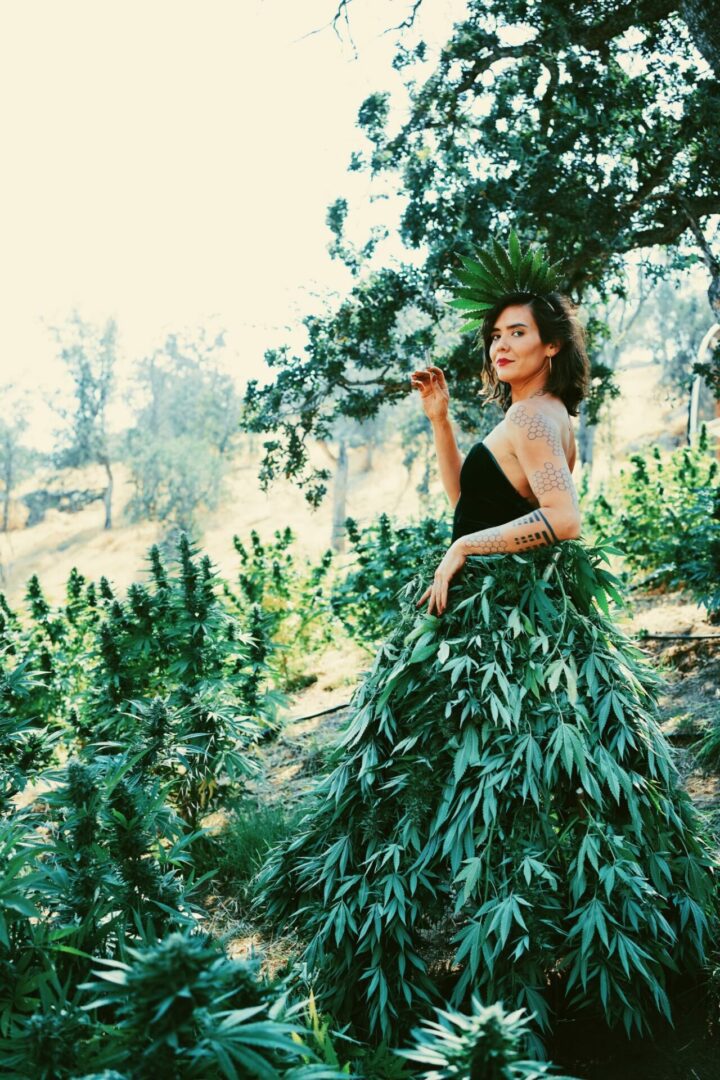
A Sit Down with Sue Carlton: Model, Cannabis Cultivator, and Fashion Designer
For a better understanding of how and why cannabis and hemp fabric in fashion is becoming more common in the industry, on stages, and on runways, I sat down with Sue Carlton. Sue is a model, cannabis cultivator, and fashion designer who comes from a long line of farmers and ranchers.
She is the first Latina hemp breeder in the United States, the creator of the strain names that represent the culture that is underrepresented in cannabis and hemp space, a designer of fashion accessories that incorporate real cannabis/hemp plants, and a model and face of brand for multiple cannabis recreational companies.
This industry is still a young one and cannabis/hemp farmers and cultivators may be hesitant to welcome the merging of cannabis and fashion as it relates to some dark history in the fashion industry. Though, as an industry that has its share of struggles, Sue offers some hopeful and positive insight into cannabis and fashion.
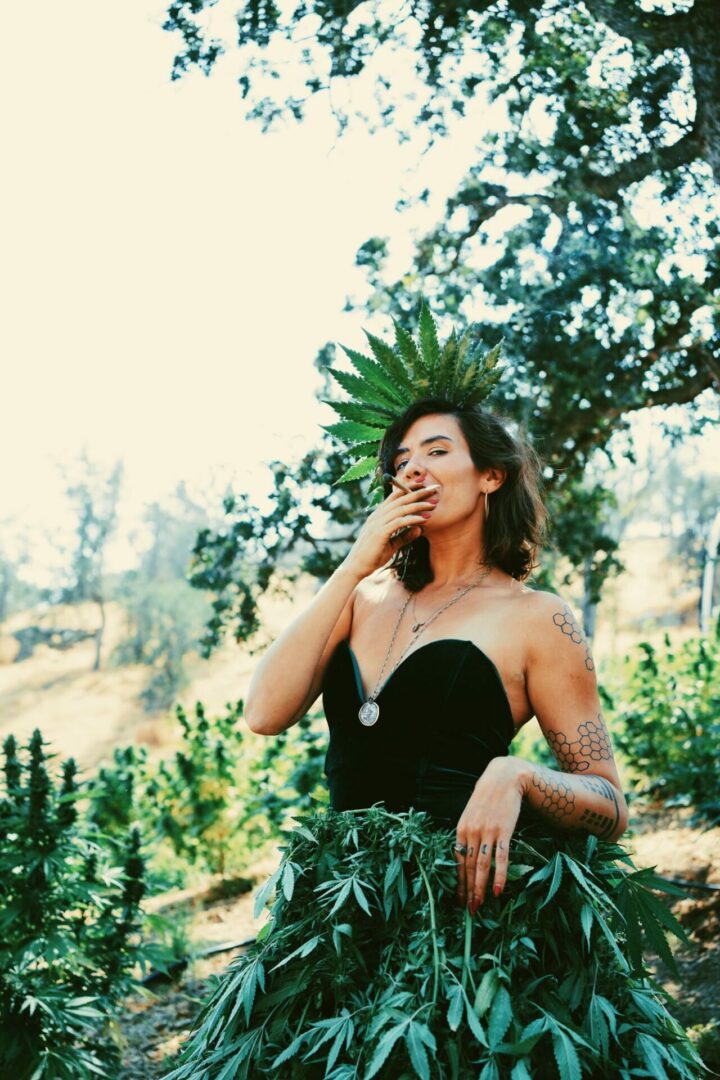
Please provide some insight into your journey combining your work in cannabis and fashion.
“When I started my own company I knew that my biggest asset was myself. It was a no-brainer to be the face of my own farm, allowing me to create authentic representation of who I am as a farmer to connect personally and directly to consumers. Throughout the journey, I found myself wanting to create clothes, jewelry, and accessories that were one of a kind to add into my photoshoots. That’s how the fashion portion blossomed. I wanted to see myself and my girls in classy attire that wasn’t really out there. Little did I know that the rest of the world would want those same pieces, so I started offering my one-of-a-kind pieces after showcasing them through photography and videography.”
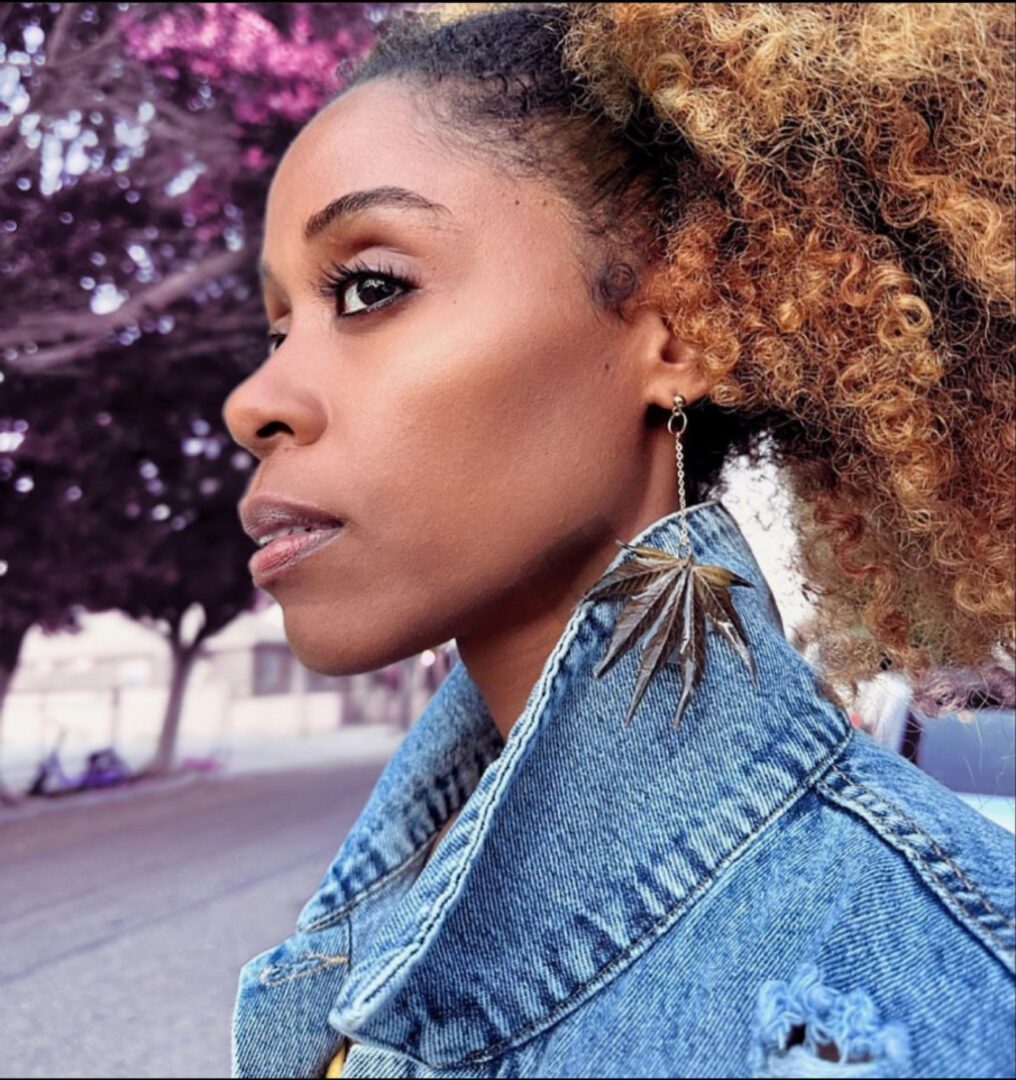
What’s your favorite thing/concept/message, about fashion?
“Fashion is expressive on multiple levels. It’s the wide range of vibes that are ultimately tied into my expression and experience of the culture of cannabis.”
As a cannabis cultivator from the legacy that has seen cannabis turn into an industry, and has seen the impacts that laws and regulations have on small businesses, do you think that cannabis businesses seeking to collaborate with mainstream businesses should consider the fashion industry? And does it depend on the type of cannabis business?
“Yes, I think cannabis industry businesses should look into partnerships and collaborations within the fashion industry. We can create a newer version of history. I would love to see more farmers, event organizers, dispensaries, and fashion-forward brands in magazines on both sides to help provide a stronger connection between the fashion industry and the cannabis industry. I do think that it’s important for the fashion industry to work with and have a hands-on consultant in the cannabis design realm as well as the farmers’ perspective within plant orientation, design, and overall aesthetics. I am open to, and actually want to expand my work in the realm of cannabis and fashion.”
Do you think that the cannabis industry can help the fashion industry be a more sustainable industry? How?
“Yes. There’s still a heavy push of fast fashion through most companies dropping new shirts and socks every day. Sustainability can take place in multiple forms from sourcing materials, to who is supported, to how and where products are made, to the overall input needed to produce. That’s why I am into accessories forever. I can tell you one thing . . . when you look through your grandmother’s keepsakes you may find a million brooches and buttons, hardly any socks or printed tees unless they were Disney or something vintage like that. When I see my pieces I can see into the future knowing that these pieces will live on for many years to come.”
In 2018, Calvin Klein featured a cannabis-themed collection in its runway show at New York Fashion Week. Most people have this view of cannabis and fashion, but fashion is so many things. In what ways do you seek to expand cannabis and fashion?
“I think the couture part is lacking currently within cannabis, with a heavy focus on the leaf imagery itself through print which is done and done in my book. I want to see the juxtaposition of high art, high fashion, and the CULTURE. I want to see more collectable, purely sustainable original pieces of art to be considered high-fashion, which is my biggest emphasis within creating.”
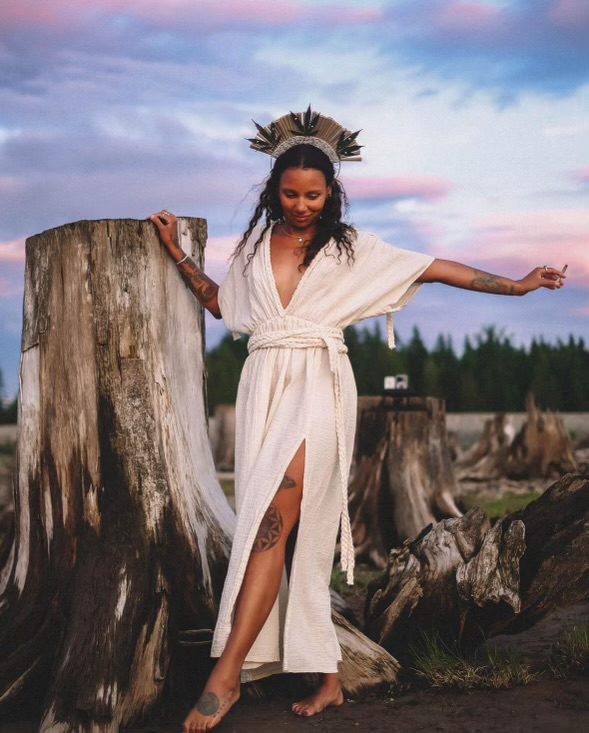
Thinking in terms of incorporating plants into the clothing/jewelry and not fabric made from the plant, which parts of the plant would be best to use for designs in fashion? Does it depend on what is being made?
“It’s the leaves for me and it definitely depends on what is being made. I see leaves as the driving factor being used in designs, though it is widely used as a mold or a print to be used. The biggest influential factor of leaves being used is because iconically, the leaf has always been used to signify the plant, whether being a government label ‘sticker,’ or when people think of the plant itself they see the five-finger staple leaf.
But the thing about the leaf, to me, is that it is unique to each plant. No two leaves will ever be the same. Which is why I love being able to use leaves to showcase the individual nature of each one. I like to say each piece of Leaf Jewelry you get from me is as unique as the person who’s buying it, no two will ever be the same.”
Are there any projects in the works as it relates to you and fashion?
“Yes, I am currently working on a few live-living art installation pieces for dispensaries and art studios. I am dropping my household leaf decor line in January, inclusive of lamp shades and mid-century inspired art wall-decor.”
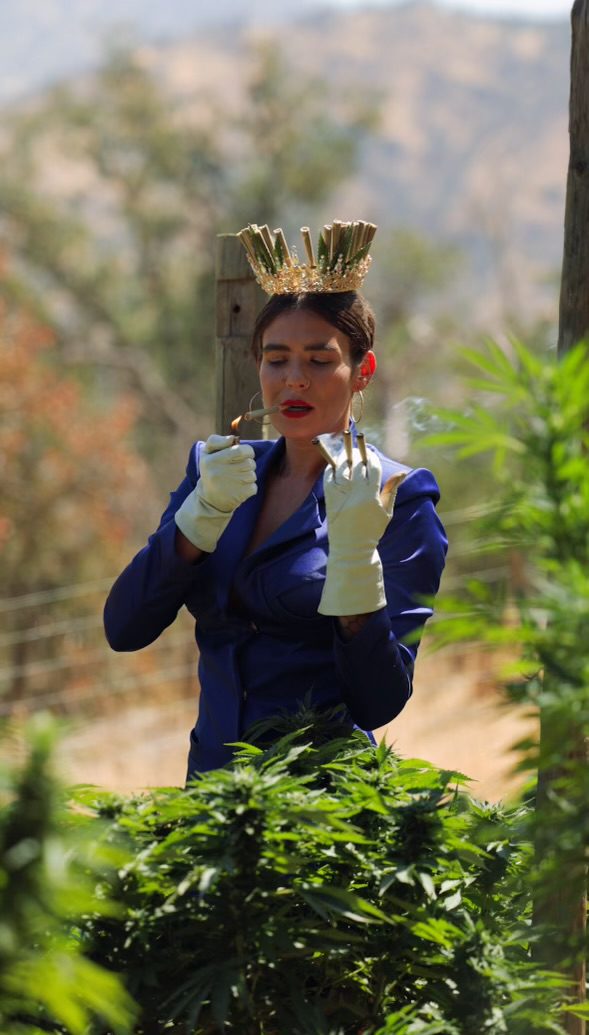
Final Words
Cannabis and fashion are merging around the globe. Calvin Klein merges the two on the runway with clothes, Highest on the Runway puts it on the runway with models smoking as they strut, and Sundae School puts it on the runway to showcase the various ways people find their light.
I asked Sue to close the interview with some things she would love to see and/or be a part of in the near future. Here is what she said:
“I would love to see and team up with a fashion company like Carhartt, to make fashion-forward clothing specific to women in grows/cultivations for both indoor and outdoor environments. Also a piece of advice for farmers/cultivators: We are our biggest marketing tool, so how we showcase our grows is important even within fashion aesthetics. Looking clean, correct, and in-style is what we want.”
Veronica Castillo is known as the Traveling Cannabis Writer. She was a nomadic writer on the road covering all things cannabis/ hemp/ and overall plant medicines and recently came back home to Florida, making it her homebase once again. Her body of work can be found in multiple industry publications both digital and print where she provides cannabis industry and community insights from her 5-year journey around the country. She is a collaborator, connector, always seeking to bring to light the hidden gems in the plant space. You can follow her journey on Instagram: @vee_travelingvegcannawriter and/or LinkedIn: @Traveling Cannabis Writer
Special Thanks to Cannabis Industry Sponsor: Zatix Luxury Cannabis Co.
100% white ash with options like OG Diesel, Blue Guava, and Grape Guava. Zatix is a luxury cannabis brand rooted in California and founded by a pioneer of the cannabis industry with over 20 years of experience. Zatix is on a mission to curate and bring to market the finest connoisseur cannabis products.
